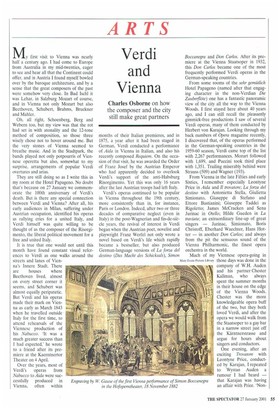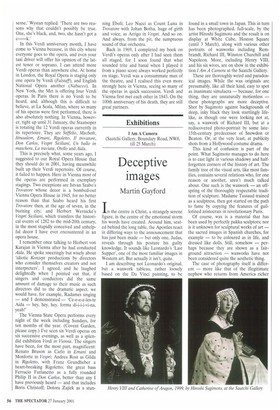Verdi and Vienna
Charles Osborne on how the composer and the city still make great partners
My first visit to Vienna was nearly half a century ago. I had come to Europe from Australia in my mid-twenties, eager to see and hear all that the Continent could offer, and in Austria I found myself bowled over by the baroque architecture, and by a sense that the great composers of the past were somehow very close. In Bad Ischl it was Lehar, in Salzburg Mozart of course, and in Vienna not only Mozart but also Beethoven, Schubert, Brahms, Bruckner and Mahler.
Oh, all right, Schoenberg, Berg and Webern too, but my view was that the rot had set in with atonality and the 12-tone method of composition, so those three wisely chose not to hover around me. But the very stones of Vienna seemed to breathe music. And in the Stadtpark, the bands played not only potpourris of Viennese operetta but also, somewhat to my surprise, arrangements of popular Verdi overtures and arias.
They are still doing so as I write this in my room at the Hotel Papageno. No doubt that's because on 27 January we commemorate the 100th anniversary of Verdi's death. But is there any special connection between Verdi and Vienna? After all, his early audiences in Milan, suffering under Austrian occupation, identified his operas as rallying cries for a united Italy, and Verdi himself was quite willing to be thought of as the composer of the Risorgimento, the liberal political movement for a free and united Italy.
It is true that one would not until this month have found constant visual references to Verdi as one walks around the streets and lanes of Vienna's Innere Stadt. There
are houses where Beethoven lived, almost on every street corner it seems. and Schubert was almost equally peripatetic. But Verdi and his operas made their mark on Vienna as early as March 1843 when he travelled outside Italy for the first time, to attend rehearsals of the Viennese production of his Nabucco. It was a much greater success than I had expected,' he wrote to a friend after its premiere at the Kaerntnertor Theater on 4 April.
Over the years, most of Verdi's operas from Nabucco toAida were successfully produced in Vienna, often within months of their Italian premieres, and in 1875, a year after it had been staged in German, Verdi conducted a performance of Aida in Vienna in Italian, and also his recently composed Requiem. On the occasion of that visit, he was awarded the Order of Franz Josef by the Austrian Emperor who had apparently decided to overlook Verdi's support of the anti-Habsburg Risorgimento. Yet this was only 16 years after the last Austrian troops had left Italy.
Verdi's operas continued to be popular in Vienna throughout the 19th century, more consistently than in, for instance, Paris or London. Indeed, after two or three decades of comparative neglect (even in Italy) in the post-Wagnerian and fin-dc-siècle years, the revival of interest in Verdi began when the Austrian poet, novelist and playwright Franz Werfel not only wrote a novel based on Verdi's life which rapidly became a bestseller, but also produced German-language versions of La forza del destino (Das Macht des Schicksals), Simon Boccanegra and Don Carlos. After its premiere at the Vienna Staatsoper in 1932, this Don Carlos became one of the most frequently performed Verdi operas in the German-speaking countries.
From some rooms of the sehr gematlich Hotel Papageno (named after that engaging character in the non-Verdian Die Zaubetflote) one has a fantastic panoramic view of the city all the way to the Vienna Woods. I first stayed here about 40 years ago, and I can still recall the pleasantly gimmick-free productions I saw of several Verdi operas, many of them conducted by Herbert von Karajan. Looking through my back numbers of Opera magazine recently, I discovered that, of the operas performed in the German-speaking countries in the 1959-60 season, Verdi came top of the list with 2,267 performances. Mozart followed with 1,699, and Puccini took third place with 1,351. Trailing miserably behind were Strauss (509) and Wagner (193).
From Vienna in the late Fifties and early Sixties, I remember especially Leontyne Price in Aida and 11 trovatore; La forza del destino with Antonietta Stella, Giulietta Simionato, Giuseppe di Stefano and Ettore Bastianini; Giuseppe Taddei as Rigoletto; James McCracken and Sena Jurinac in Otello; Hilde Gueden in La traviata; an extraordinary line-up of great singers — Jurinac, Simionato, Boris Christoff, Eberhard Waechter, Hans Hotter — in another Don Carlos; and always from the pit the sensuous sound of the Vienna Philharmonic, the finest opera orchestra in the world.
Much of my Viennese opera-going in
Mary Evans Picture Library those days was done in the company of W.H. Auden and his partner Chester Kallman, who always spent the summer months in their house on the edge of the Vienna Woods. Chester was the more knowledgeable opera buff of the two, but they both loved Verdi, and after the opera we would walk from the Staatsoper to a gay bar in a narrow street just off the Karntnerstrasse and argue for hours about singers and conductors.
One evening, after an exciting Trovatore with Leontyne Price, conducted by Karajan, I repeated to Wystan Auden a rumour I had heard — that Karajan was having an affair with Price. 'Non
sense.' Wystan replied. 'There are two reasons why that couldn't possibly be true. One, she's black, and, two, she hasn't got a —k . '
In this Verdi anniversary month, I have come to Vienna because, in this city where everyone goes to the opera, and even your taxi driver will offer his opinion of the latest tenor or soprano, I can attend more Verdi operas than anywhere else. At home in London, the Royal Opera is staging only one opera by Verdi (Falstaff), and English National Opera another (Nabucco). In New York, the Met is offering four Verdi operas. In Paris there is no Verdi to be heard, and, although this is difficult to believe, at La Scala, Milan, where so many of his operas were first performed, there is also absolutely nothing. In Vienna, however, right up until 31 January, the Staatsoper is rotating the 12 Verdi operas currently in its repertoire. They are Stiffen°, Macbeth, Jerusalem, Emani, Rigoletto, II trovatore, Don Carlos, Vespri Siciliani, Un ball° in maschera. La traviata, Otello and Aida.
This is precisely what, some years ago, I suggested to our Royal Opera House that they should do in 2001, having meanwhile built up their Verdi repertoire. Of course, it failed to happen. Here in Vienna most of the operas are performed in exemplary stagings. Two exceptions are Istvan Szabo's Trovatore whose decor is a bombed-out Vienna Opera House in 1945, for no better reason than that Szabo heard his first Trovatore then, at the age of seven, in the burning city; and Herbert Wernicke's Vespri Siciliani, which transfers the historical events of 1282 to the mid-20th century, in the most stupidly conceived and unhelpful decor I have ever encountered in an opera house.
I remember once talking to Herbert von Karajan in Vienna after he had conducted Aida. He spoke sneeringly but wisely about 'idiotic Konzept productions by directors who consider themselves creators and not interpreters'. I agreed, and he laughed delightedly when I pointed out that, if singers and conductors did the same amount of damage to their music as such directors did to the dramatic aspect, we would have, for example, Radames singing — and I demonstrated — `Ce-e-e-e-les-te Aida — hey, hey, hey, forma di-i-i-i-vi-na, yeah!'
The Vienna State Opera performs every night of the week including Sundays, for ten months of the year. (Covent Garden, please copy.) I've seen six Verdi operas on six successive evenings, as well as a splendid exhibition Verdi in Vienna. The singers have been, for the most part, magnificent: Renato Bruson as Carlo in Emani and Monforte in Vespri; Andrea Rost as Gilda in Rigoletto, with Franz Grundheber a heart-breaking Rigoletto; the great bass Ferrucio Furlanetto as a fully rounded Philip II in Don Carlos, better than any I have previously heard — and that includes Boris Christoff; Dolora Zajick as a stun
fling Eboli; Leo Nucci as Count Luna in Trovatore with Johan Botha, huge of girth and voice, as Arrigo in Vespri. And so on. And always, from the pit, the sumptuous sound of that orchestra.
Back in 1969, I completed my book on Verdi's operas only after I had seen them all staged, for I soon found that what sounded trite and banal when I played it from a piano score always worked perfectly on stage. Verdi was a consummate man of the theatre, and I realised this even more strongly here in Vienna, seeing so many of the operas in quick succession. Verdi and Vienna first met each other in 1843. On the 100th anniversary of his death, they are still great partners.























































































 Previous page
Previous page